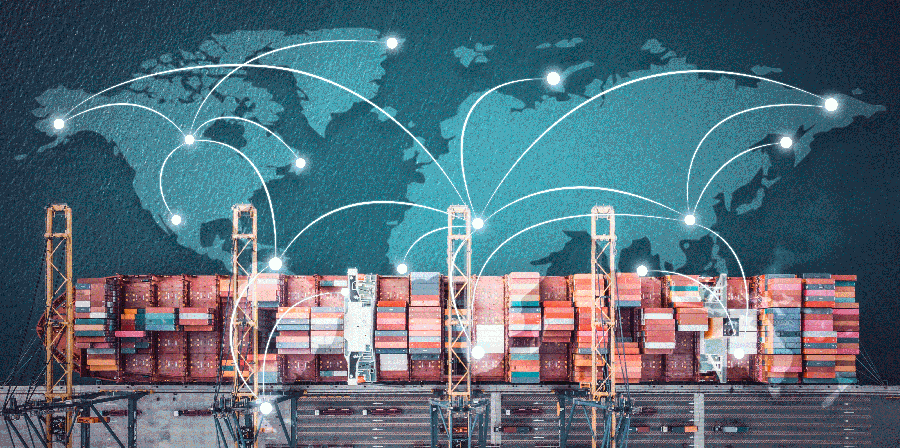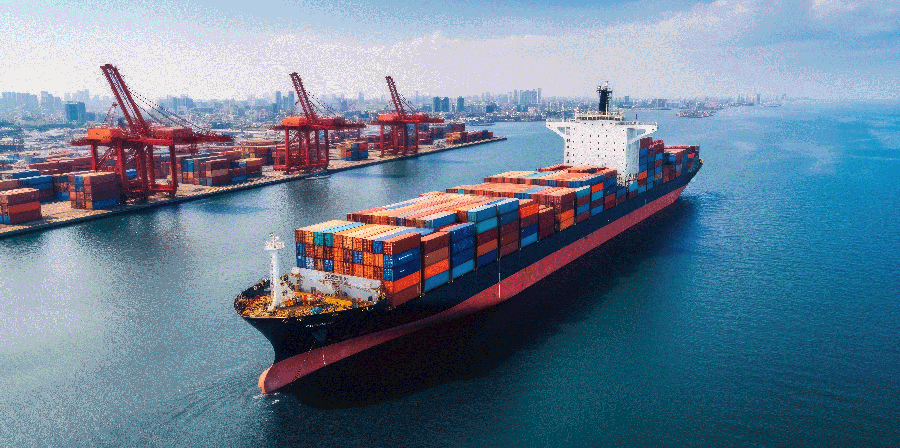The world of ocean freight is a complex web of trade routes, ports, and infrastructure. At the heart of this network, the Port of Baltimore plays a crucial role.
However, the recent collapse of the Francis Scott Key Bridge has sent ripples through the industry. The impact on the Port of Baltimore has been significant, affecting container forwarding and cargo handling. In response, freight has been rerouted to the Port of Virginia, prompting infrastructure updates at this port.
This article delves into the intricate dynamics of this situation, exploring the effects on both ports and the wider implications for ocean freight.
Join us as we navigate the aftermath of the bridge collapse and its impact on the Port of Baltimore and the Port of Virginia.
The Strategic Importance of the Port of Baltimore in Global Trade
The Port of Baltimore is more than just a port. It's a vital cog in the global trade machine. Located strategically on the East Coast of the United States, it serves as a gateway for goods moving in and out of the country. Its deep-water berths and state-of-the-art facilities make it a preferred choice for many shipping companies.
The port's ability to handle large volumes of cargo efficiently has earned it a reputation as a reliable partner in global trade.
However, the recent bridge collapse has put this status under threat, highlighting the vulnerability of such critical infrastructure.
The Francis Scott Key Bridge: A Vital Artery for Ocean Freight
The Francis Scott Key Bridge is not just a bridge. It's a lifeline for the Port of Baltimore.
Spanning the Patapsco River, it serves as a critical link for trucks carrying containers to and from the port. Its strategic location and design allow for the smooth flow of traffic, ensuring timely delivery of goods.
However, the recent collapse of this vital artery has disrupted this flow, causing significant challenges for ocean freight operations.
The Day the Bridge Fell: Immediate Effects on Traffic and Freight
The day the Francis Scott Key Bridge collapsed was a day of chaos. Traffic came to a standstill, and the flow of goods was abruptly halted. The immediate impact was felt by the trucks that were en route to the Port of Baltimore. They were forced to take detours, leading to delays in the delivery of goods.
The ripple effect of this incident was felt far beyond the immediate vicinity of the bridge. It disrupted the schedules of ships waiting to offload their cargo at the port, leading to a backlog that took weeks to clear.
Ocean Freight's Role and the Ripple Effect of the Collapse
Ocean freight plays a crucial role in global trade. It is the lifeblood of the Port of Baltimore, facilitating the movement of goods across continents. The bridge collapse disrupted this vital artery, causing a ripple effect that was felt across the globe.
The immediate impact was on the ships that were en route to the port. They were forced to reroute to other ports, leading to delays and increased costs. This had a knock-on effect on the supply chains of businesses that rely on timely deliveries of goods. The long-term impact is still being assessed. However, it is clear that the disruption has caused significant challenges for the logistics industry. It has highlighted the vulnerability of global supply chains to unexpected events and the need for robust contingency plans.
Rerouting to the Port of Virginia: A Viable Solution?
In the wake of the bridge collapse, the Port of Virginia emerged as a viable alternative for rerouting ocean freight. Its strategic location and robust infrastructure made it an attractive option for shipping companies looking to minimize disruptions. However, the sudden influx of freight posed its own challenges. The port had to quickly ramp up its operations to handle the increased volume. This required careful coordination and planning to ensure smooth cargo handling and container forwarding.
Despite these challenges, the Port of Virginia has demonstrated its resilience and adaptability. It has shown that it can effectively manage unexpected situations and continue to facilitate global trade. This experience will undoubtedly inform future infrastructure updates and improvements at the port.
Container Forwarding Challenges Amidst Infrastructure Strain
The sudden rerouting of ocean freight to the Port of Virginia put a strain on its infrastructure. The port had to handle a significant increase in container forwarding, which presented logistical challenges. The port had to quickly adapt its operations to accommodate the increased volume. This required careful planning and coordination among various stakeholders, including shipping companies, logistics providers, and port authorities.
Despite these challenges, the Port of Virginia has shown its ability to handle such situations effectively. The experience has highlighted the importance of having robust and adaptable infrastructure in place to handle unexpected disruptions in the global supply chain.
Economic Implications: Local and National Perspectives
The Francis Scott Key Bridge collapse had significant economic implications, both locally and nationally. Locally, businesses relying on the Port of Baltimore for import/export faced immediate disruptions. This led to increased costs and potential delays in their operations. Nationally, the incident highlighted the vulnerability of the country's infrastructure to unexpected events. It underscored the need for investment in infrastructure maintenance and improvement. The rerouting of freight also had potential implications for transportation costs and consumer prices.
The incident served as a stark reminder of the critical role that infrastructure plays in supporting the economy. It emphasized the need for proactive measures to ensure the resilience of the country's transportation networks.
The Response from Logistics and Shipping Companies
The bridge collapse prompted a swift response from logistics and shipping companies. They had to quickly adapt to the new circumstances, rerouting their ships and managing the sudden change in their operations. This required effective communication and coordination among various stakeholders.
These companies also had to deal with the container forwarding challenges that arose due to the rerouting of freight. They had to ensure that their operations remained efficient and that their clients were kept informed about the situation. This highlighted the importance of contingency planning in the logistics industry.
Despite the challenges, the incident also presented opportunities for these companies. They could demonstrate their adaptability and resilience in the face of unexpected events. It also underscored the importance of technology in managing and mitigating the impact of such infrastructure failures.
Port of Virginia's Infrastructure Updates and Future Readiness
The Port of Virginia found itself in the spotlight as a viable alternative for rerouted freight. The port had to quickly ramp up its operations to handle the increased freight volumes. This required significant infrastructure updates and improvements. The port's readiness was put to the test, highlighting the importance of investment in port infrastructure. The incident also underscored the role of government agencies in supporting the affected ports and managing the crisis. The Port of Virginia's response demonstrated its capacity to handle such disruptions and its importance in the global shipping network.
Looking ahead, the Port of Virginia is poised to play an even more significant role in global trade. The experience has shown the importance of resilience and adaptability in the face of unexpected challenges. It has also highlighted the potential for long-term changes in the logistics industry as a result of such incidents.

Jillamy Freight Management Solutions: Mitigating Disruptions and Ensuring Continuity
Amidst the chaos and challenges triggered by the collapse of the Francis Scott Key Bridge, logistics companies like Jillamy have stepped in to provide crucial support. With their expertise in supply chain management and freight forwarding, Jillamy offers innovative freight management solutions to mitigate disruptions and ensure the continuity of operations.
- Strategic Routing and Optimization: Jillamy leverages advanced technology and industry insights to reroute freight efficiently. By analyzing alternative transportation routes and modes, they help businesses navigate around the impacted area, minimizing delays and optimizing delivery times.
- Dynamic Supply Chain Visibility: In times of crisis, visibility across the supply chain is paramount. Jillamy's comprehensive tracking and monitoring systems provide real-time updates on cargo movement, allowing businesses to proactively address any disruptions and adjust their operations accordingly.
- Flexible Warehousing and Distribution Solutions: To alleviate congestion and storage issues caused by rerouted freight, Jillamy offers flexible warehousing and distribution services. By strategically positioning inventory and implementing agile distribution strategies, they help businesses maintain inventory levels and meet customer demands despite the challenges.
- Customized Contingency Planning: Recognizing the importance of preparedness, Jillamy collaborates with clients to develop customized contingency plans tailored to their specific needs. These plans include risk assessments, alternative routing strategies, and emergency response protocols, ensuring readiness to tackle unforeseen events effectively.
- Dedicated Customer Support: In times of crisis, responsive and dedicated customer support is indispensable. Jillamy's team of logistics experts provides round-the-clock assistance, offering guidance, troubleshooting, and proactive communication to keep clients informed and empowered throughout the recovery process.
By partnering with Jillamy, businesses can navigate the complexities of the aftermath of the Francis Scott Key Bridge collapse with confidence. With their proactive approach, innovative solutions, and unwavering commitment to customer success, Jillamy helps businesses weather the storm and emerge stronger in the face of adversity.
Conclusion: Lessons Learned and the Path Forward
The Francis Scott Key Bridge collapse and its impact on ocean freight operations at the Port of Baltimore have provided valuable lessons for the logistics industry. The incident underscored the importance of contingency planning, infrastructure maintenance, and investment. It also highlighted the need for diversification of transportation routes and methods, and the potential for technological innovations to prevent or mitigate future infrastructure failures.
The incident has also sparked discussions on policy and regulatory changes, the role of public-private partnerships in port development, and the importance of a proactive approach to infrastructure maintenance. It has also highlighted the potential for increased scrutiny of infrastructure projects and their impact on trade.
Moving forward, the logistics industry must take these lessons to heart. It must continue to innovate, invest in infrastructure, and develop robust contingency plans. Only then can it ensure the smooth flow of global trade, even in the face of unexpected challenges.
Jillamy stands ready to provide tailored solutions to meet your specific needs, ensuring resilience and continuity in the face of adversity. Let us partner with you on the path to a more resilient and efficient supply chain future. For expert assistance in navigating disruptions and optimizing your supply chain operations, contact us.


